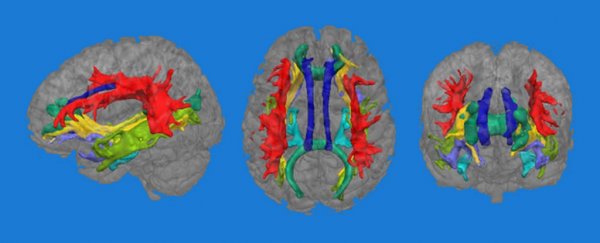Scientists have identified a link between depression and the structure of white matter in the brain, those areas responsible for connecting up grey matter and making sure our emotions and thoughts are properly processed.
The study could be valuable in suggesting new ways to treat and manage depression, if we can work out how these white matter changes affect mood and anxiety.
Researchers from the University of Edinburgh in the UK looked at data from 3,461 adults taken from the UK Biobank database, and say the large sample size adds some useful extra weight to the findings, considering results from previous studies on brain matter and depression have been inconsistent.
"This study uses data from the largest single sample published to date and shows that people with depression have changes in the white matter wiring of their brain," says one of the team, Heather Whalley.
A technique called diffusion tensor imaging was used to map areas of white matter in the brain – this is based on magnetic resonance imaging ( MRI) and gives scientists a way of modelling the fibres in the brain in better detail than ever before.
 Detailed brain scans revealed links between white matter and depression. Credit: Scientific Reports
Detailed brain scans revealed links between white matter and depression. Credit: Scientific Reports
Scans revealed that the white matter integrity – the quality of the white matter – was reduced in people who reported symptoms of depression, while in those with no symptoms the white matter integrity appeared to be normal.
That difference might be the result of patterns of brain activity brought on by depression, say the researchers, though it's too early to say that's exactly what's happening.
Eventually, the study could open up new ways of predicting the risk of depression or understanding more about how white matter integrity helps to protect against it.
According to the World Health Organisation, more than 300 million people worldwide have difficulty with depression, across all ages. It's actually now recognised as the leading cause of disability worldwide, to get a sense of just how big a problem it is now known to be.
Scientists are now making progress in figuring out more about the relationship between depression and the wiring of the brain. One innovative treatment in development uses magnetic pulses to alter the circuits of the brain and the way they interact.
Meanwhile specific areas of the brain have also been linked to problems with depression – a study published last year found that feelings of loss and low self-esteem were tied to the functioning of the orbitofrontal cortex, which handles sensory integration, expectation, and decision-making.
While we can't draw any definitive conclusions out of the new research, it's another step forward in terms of understanding depression's impact on the brain and finding ways to put a stop to it.
"There is an urgent need to provide treatment for depression and an improved understanding of its mechanisms will give us a better chance of developing new and more effective methods of treatment," says Whalley.
The findings have been published in Scientific Reports.
